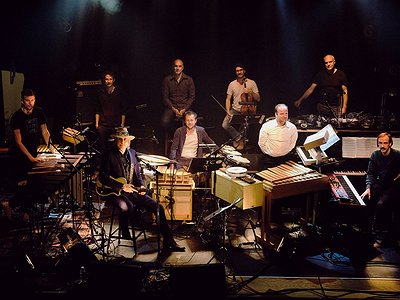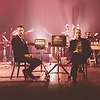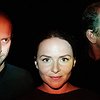Part 2
As creative goals and technical abilities change, so does the need for different tools of expression, be it instruments, software tools or recording equipment. Can you describe this path for you, starting from your first studio/first instrument?
Aarich: Analogue recordings were the standard when we started.
There’s something magical about analogue recordings.You only have one shot to perform your parts and this gives you a focus and your performance is in many cases the best you can do. This changed with digital recordings and multitrack sessions where the options to edit or adjust every part are endless.
I don’t want to say that one is better than the other, it’s just an evolution of how we work. Digital recordings has given us the opportunities to work on multitrack recordings on a computer at home any time we want to. As a result of this evolution, the real instruments we would need have been replaced by midi instruments and the palette of instruments available is endless. There’s more diversity in our sound and productions because of these possibilities.
Kobe: Regardless of the source of a sound, it is important to us that something should be playable. Something that is an extension of the musician. So you write with a musician's character, technicality and artistic freedom in mind. That musician's interpretation of that writing makes the final sound and power of a composed part.
Over the years we have come to feel each other better both individually and as a group. The fact that the musicians know perfectly where Aarich and I want to go with a composition without us having to add many words to the score is worth its weight in gold. That's an evolution over the years that we couldn't have dreamed of becoming a part of our compositions. The color of a seasoned group of musical friends.
What motivated some of the choices you made in terms of instruments / tools / equipment over the years?
Aarich: Like a painter we built a palette of virtual instruments all in the Box. This palette is constructed by the people in the orchestra (mallet instruments, piano, synth, clarinet, violin, viola, double bass …). I feel very comfortable in this world of sound and it is easy to translate our midi sketches to the live playing of the orchestra.
A new element can be very refreshing to work on ideas, so a Casio keyboard or LABS (spitfire) are very helpful to start an idea. In fact, adding any weird instrument is a trigger for a new way of writing.
Have there been technologies or instruments which have profoundly changed or even questioned the way you make music?
Aarich: Everything that is available in a software recording program (effects, EQ, editing, looping, reverse, stretch, pitch) has a huge impact on the way we make music. The waves on the computer are processed in a collage of work. The sound of an instrument can be more ambiguous when manipulated. Elements of the new music are sometimes more abstract than we used to make before the computer era.
Kobe: My technical knowledge of music is minimal. Despite my studies as a drummer and percussionist, I am mainly trained in listening.
I have a disability that makes it difficult for me to retain information. But this disability has also taught me that relying on your ears is very important and a gut feeling usually does not lie. Being able to articulate to others what that gut feeling is about or stands for is another skill I am still learning, that trust is essential in making compositions for and with others.
When Aarich and I write together, communication tools are the most important part of the job.
Collaborations can take on many forms. What role do they play in your approach and what are your preferred ways of engaging with other creatives through, for example, file sharing, jamming or just talking about ideas?
Aarich: Every collaboration is different so there are many ways to do it. Every example is possible.
One thing that is very important; to share the same room while working together. There’s no better way of communication than standing next to each other. This is not always possible, especially in this last year, and then we manage to create a dialogue anyway. But as I said; there’s nothing like being together.
Take us through a day in your life, from a possible morning routine through to your work, please. Do you have a fixed schedule?
Aarich: When working alone, I start by noodling on a guitar or piano until I come up with something that I find intriguing. I record a bit of it and then I start building other parts on top of this. From time to time I might take a break (a walk, a bicycle ride, sit in the sun) to reflect on what I just had been working on. Sometimes I think of references, music that I think is related to the idea that I’m working on, and then I investigate what other people would do with a similar idea. I sketch different approaches for tempo, groove or tonality until I’m happy with the progress it’s taken. Once I have a vague idea, I send it to Kobe to have his first impressions on what I have.
On the second day I would rework ideas or start a new sketch. Though most of the days are interrupted by calls and mail regarding the organisation of our orchestra.
Kobe:I don't think my working process is that much different from Aarich's. It's just that I work at a different pace. With me, the ideas go on paper very quickly. I usually work from an impulse, an atmosphere that I seek out or have and don't try to let go of until a basic concept is on paper. Throwing lots of ideas on one heap creates a mountain of confusion. The peace that I seek is meant to balance on that mountain, hoping to see reality in the distance behind the horizon.
Writing is an energy for me, a whirlwind approach to inspiration sometimes takes a while, but once the boat has sailed there is wind in the sails. Not always constructive, but a lot of fun to sail.
How do music and other aspects of your life feed back into each other - do you separate them or instead try to make them blend seamlessly?
Aarich: There’s always a little chaos involved in family life, studio work and activities of all kinds, and they do blend seamlessly. It is not easy to separate them, and most of the time I enjoy the little chaos.
Kobe: Music is a passion, and that passion I want to share above all with friends, family, colleagues and the public. And yet I do try to separate the moments of my personal life enough from the moments when I work. But of course you can't separate a passion from who you are at the moment you're not working. It would also be very banal and boring if the musical creation that energizes, inspires, and challenges you could only happen on the so-called work floor.








